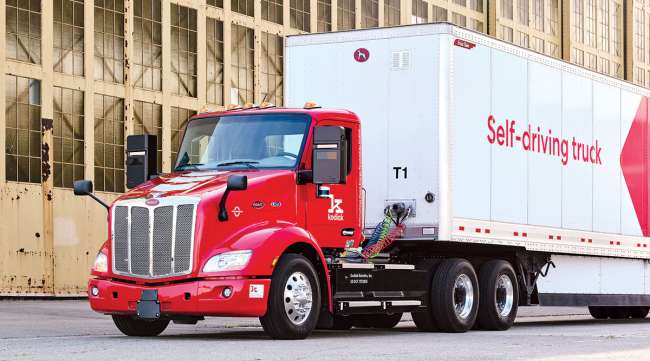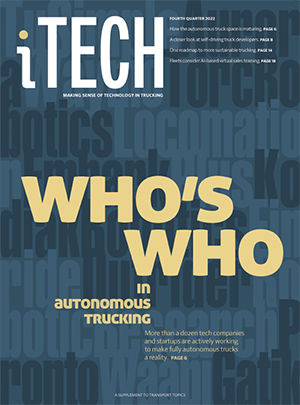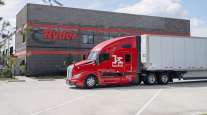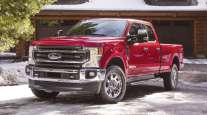The Dallas Morning News
Kodiak Unveils Driverless-Ready Semi Ahead of Dallas Debut

[Stay on top of transportation news: Get TTNews in your inbox.]
Kodiak Robotics introduced what it billed as the world’s first driverless-ready semi-truck designed for scaled deployment at CES in Las Vegas this week.
The sixth-generation truck is equipped with redundant software and follows five years of real-world testing of driverless technology, according to the company. Kodiak will use the truck for the driverless operations it plans to initiate between Dallas and Houston this year.
Kodiak joins other autonomous vehicle firms like Aurora Innovation in unveiling their latest tech at the annual trade show. With several companies piloting driverless programs on Texas roadways using safety drivers over the last several years, firms like Kodiak are racing to emerge as leaders in the potentially lucrative self-driving space.
In August, Kodiak said it would open a truck port in partnership with Pilot for its autonomous trucks in the Atlanta area. Loadsmith, C.R. England, Tyson, Ikea, Werner and Forward Air are among the company’s recently announced partnerships.
C.R. England ranks No. 28 on the Transport Topics Top 100 list of the largest for-hire carriers in North America.
Werner ranks No. 17 on the for-hire list and No. 34 on the TT Top 100 list of the largest logistics companies.
Forward Air ranks No. 1 on the TT sector list of the top air/expedited carriers in North America. It ranks No. 27 on the for-hire TT 100.
Tyson ranks No. 11 on the TT Top 100 list of the largest private carriers in North America.
Customers will pay a per-mile fee to use the Kodiak Driver system on their trucks, with Kodiak retaining oversight of the system.

With promises of cutting labor costs and freight time, as well as filling gaps left by driver shortages, companies like Uber and Amazon are investing millions in the developing technology. Kodiak said a truck running its driverless system could earn companies two to three times as much as those operated by human drivers.
Amazon ranks No. 1 on the TT Top 50 list of the largest global freight companies and No. 9 on the TT Top 100 list of the largest private carriers in North America.
“The Kodiak Driver doesn’t get tired, doesn’t get distracted, doesn’t get drowsy, doesn’t need to take breaks except to refuel,” Kodiak director of external affairs Daniel Goff said.
But critics say with little oversight on the industry, major players are prioritizing profits over safety.
Texas roadways have become a hot spot for testing driverless tech. Texas passed Senate Bill 2205 in 2017, making it legal for autonomous vehicles to operate on state roadways whether or not a licensed human operator is present.
Opponents point to complaints and accidents involving driverless vehicles such as the Cruise autonomous taxi program, which the California Department of Motor Vehicles shut down in October, citing an “unreasonable risk to public safety.” Austin public safety officials have described close calls with emergency vehicles and driverless cars ignoring police directing traffic.
Because they operate on fixed highway routes rather than the stop-and-go traffic of city streets, proponents say autonomous trucking doesn’t pose the same challenges as robotaxis. Critics aren’t convinced.

Who's Who in the Autonomous Space
►Overview of Self-Driving Truck Development
Company Sketches
Click the links to jump to profiles of autonomous companies.
Aurora | Waymo | TuSimple | Gatik | Locomation | Torc Robotics | Waabi | Einride | Plus | Embark | Kodiak Robotics | Robotic Research | Outrider | Pronto
"The danger and severity of accidents will be multiplied a hundredfold when the accident involves a tractor-trailer versus a car,” said Amy Witherite, founder of Dallas-based Witherite Law Group, which specializes in accident cases.
Motorists are also apprehensive: A 2023 survey by AAA found that fear of self-driving vehicles is rising, with 68% of drivers reporting anxiety about encountering fully autonomous vehicles on the roadways, up from 55% in 2022.
Accidents involving driverless vehicles will likely make it more difficult to recover damages, according to Witherite.
“Individuals injured in a crash with an autonomous vehicle will face a much more difficult time determining who was at fault and (who) will be responsible for deaths, serious injuries or property damage,” Witherite said. “The amount of finger-pointing between various parties will increase tenfold because of all the technology involved.”
Autonomous trucking companies disagree the tech poses a significant safety risk. Kodiak said its self-driving system “is designed to be safer than a human driver.”
“We’re actually operating under the strictest possible regulatory structure, which is we have to report anything that happens in one of our trucks — any incident, no matter how minor — to the U.S. federal government, to the U.S. Department of Transportation,” Kodiak’s Goff said. “All that data is published publicly and it shows really only a handful of minor incidents in this industry in over the last 2½ years since the public reporting became available. The safety record of this industry is incredibly strong.”
Its latest iteration includes safety upgrades, with trucks featuring 12 cameras, four lidar sensors used to determine range and six radar sensors. Driverless trucks won’t hit roadways until the company has completed its “safety case” demonstrating that its autonomous trucks are as safe as those operated by humans. They’ll share that data with regulatory agencies like TxDOT and the Texas Department of Public Safety, Goff said.
Want more news? Listen to today's daily briefing above or go here for more info
Companies like Kodiak are also coming up with creative ways to plan for situations that would otherwise require driver intervention.
While federal regulations require truck drivers to use warning devices like road flares to alert other drivers of a breakdown, the autonomous trucking industry is applying for an exemption to the rules. If the exemption is approved by the Federal Motor Carrier Safety Administration, Kodiak trucks will instead feature “extra-bright” hazard lights designed to act as warning devices after a breakdown.
Kodiak said it will keep employing new capabilities, such as adding a domain control system designed to continuously improve the truck’s sensor and machine learning capabilities later this year.
Distributed by Tribune Content Agency, LLC




